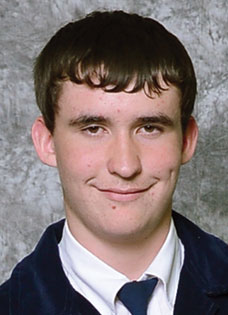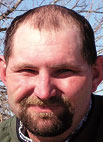
The scientific method is more than just a concept learned in science class for Jacob Noblitt, a junior at Bolivar High School and a member of the Bolivar FFA Chapter in Bolivar, Mo.
For the past two years, Jacob has been forming hypotheses, conducting research, and collecting data for his Supervised Agricultural Experience Program (SAE).
Jacob started raising and showing chickens when he was in seventh grade.
“I realized the bigger the bird, the better it did at the show,” he said. “It made me wonder how different types of feed would affect how they would grow.”
This led Jacob to formulate his first experiment when he was a freshman.
“I tested different brands of chick feed to see which brand would make the chicks grow the biggest,” he explained.
Jacob chose to test the breeds he planned to show that year, which included Polish, Silkie and Cochin. He started the experiment by purchasing day-old chicks. Jacob had two test groups which consisted of six chicks, two of each breed. One group was fed a medicated chicken starter-grower, other group was fed a non-medicated chick grower. Both feeds contained 18 percent crude protein.
”I weighed them every week, for six weeks,” said Jacob. He discovered the chicks grew faster when fed the medicated feed, which also contained a higher percentage of fat and fiber than the non-medicated feed. Aside from the growth difference, he noticed their feathers came in faster.
“The group that received the medicated feed started feathering fully at four weeks, the other group at five weeks.
Jacob wanted to conduct another experiment. During the fall of his sophomore year, he teamed up with his friend, Jesse Toombs, to test how different brands of cattle dewormer would affect calf gain in a 12-week period.
“We decided together that we would use cattle because Jesse’s family was getting ready to wean 15 beef calves. They needed to be given dewormer because they were coming off the cows. That is when we decided to test the different brands of cattle dewormer on their growth to see if one had a bigger impact on the growth than the others,” explained Jacob.
With the help of Jesse’s mom, Dr. Franka Figari, a veterinarian at Countryside Vet Clinic in Bolivar, they decided to test four different brands of injectable dewormers.
“(The wormers) all hit the same parasites, but they each have a different active ingredient,” said Jacob. “The control group got a shot of sterile saline, so those calves had the same experience of being run through the chute and getting an injection,” he added.
The experiment was conducted on 15, 500 to 600 pound crossbred calves; 10 heifers and five steers. Jacob and Jesse split the calves into five groups consisting of two heifers and one steer.
“The calves were all fed a 14 percent protein stocker calf feed and had hay, grass, and water at all times and were all in the same pasture,” explained Jacob.
To measure the gain of the calves, Jacob and Jesse weighed the calves every two weeks for 12 weeks.
“We found that the calves given the long-lasting dewormer gained the most in the 12 weeks. The ones given LongRange had the greatest gain of 126 pounds. The lowest was the control group with 92 pounds of gain,” said Jacob. “We think that is because it gives them the full, season-long coverage so we do not have to give them a booster dose or anything; every other brand required a booster dose.”
The LongRange dewormer required fewer injections, resulting in less stress and less shrinkage.
“I enjoyed being involved and learning more about how to conduct research,” Jacob said. He did not have prior experience working cattle, and learned Beef Quality Assurance (BQA) techniques through the course of the experiment.
“We learned where to give the injectable dewormer, which is in the triangle of the neck. We also learned the difference between intramuscular and subcutaneous shots. The dewormer we gave was a subcutaneous shot that goes underneath the skin,” commented Jacob.
Both Jacob’s poultry and beef experiments have received state and national recognition. Jacob’s research has placed first in the Missouri FFA Agriscience Fair Animal Systems Division the past two years, qualifying him to compete in the National FFA Agriscience Fair, where he received eighth place with his poultry experiment and 10th place with his beef experiment.
Aside from competing in the Agriscience Fair, Jacob also won the Missouri FFA Agriscience Research – Animal Systems Proficiency Award and was selected as one of the top four finalists at National FFA Convention.
Jacob will represent Missouri this summer on the Costa Rica Proficiency and Stars Travel Seminar, a 10-day international agriculture experience.
“In the future I would like to become an agriculture teacher. I like being involved in FFA, helping others, and doing stuff like this,” he remarked. Jacob is the son of Paul and Valerie Noblitt and his FFA Advisors are Ashley Brown and Jason King.







